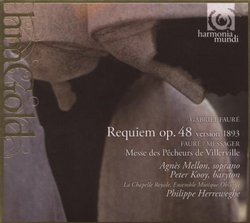| All Artists: Peter Kooy, Gabriel Faure, Philippe Herreweghe, Ensemble Musique Oblique, Agnès Mellon Title: Faure: Requiem; Messe des PÍcheurs de Villerville Members Wishing: 0 Total Copies: 0 Label: Harmonia Mundi Fr. Release Date: 9/9/2008 Album Type: Enhanced, Import Genre: Classical Styles: Opera & Classical Vocal, Chamber Music, Historical Periods, Classical (c.1770-1830), Early Music, Modern, 20th, & 21st Century Number of Discs: 1 SwapaCD Credits: 1 UPC: 794881853427 |
Search - Peter Kooy, Gabriel Faure, Philippe Herreweghe :: Faure: Requiem; Messe des PÍcheurs de Villerville
 | Peter Kooy, Gabriel Faure, Philippe Herreweghe Faure: Requiem; Messe des PÍcheurs de Villerville Genre: Classical |
Larger Image |
CD Details |
CD ReviewsAs it's intended to be Syrinx | Austria | 10/30/2008 (5 out of 5 stars) "Faure wrote this Requiem "simply for pleasure, not for any event" where he reflected his personal conpect of death "as a happy deliverance". His Requiem has a couple of different versions. The 1888 version only has five movements. 1893 version has all the seven movements; it's written for soloists, lower strings (there is only a violin part in 'In Paradisum' and a solo violin part in Sanctus), choir, organ, timpani, harp, horns and trumpets. The last version (1901) is orchestrated for the full orchestra due to the publisher's advise to prepare a version for full symphony orchestra. Apparently, Faure was not keen on re-orchestrating his piece, so this job was left to his student(s), where the name of Roger Ducasse comes forward. Which means that the 1893 version had everything that Faure intended for this piece. In fact, most of the woodwind parts in 1901 version derive directly from organ parts.
Thus my personal opinion is that the 1893 version is the most 'complete' -which not always means 'more'- and sincere overall. It has all the movements Faure composed, and is orchestrated only the way he intended to. My -again very personal- opinion is that a piece loses its sincerity when it is orchestrated for a different medium. Take Rossini's 'Petite Messe Solennelle' for instance: Even though it's skillfully orchestrated for full orchestra by the composer, the version for the small ensemble makes me always feel much more 'home'. On to the recording, I simply find it magical. The choir sings wonderfully, every group sounds very clear and moving. Listen to the part where the choir sings the theme of the baritone in the end of 'Libera me', where Faure cleverly brought a freshness to the piece. In every part of Requiem the choir is just great, they never destroy the sacred feeling of this piece. Listen to the tenors in the beginning of 'Agnus Dei' for instance. And the soprano solo in 'Pie Jesu'? I haven't heard such a pure soprano for a long time. Such peaceful and magical singing, just like Faure's Requiem in comparison with the "painful passing away Requiems". To be compared with the recording of C.M. Giulini, where Kathleen Battle completely ruins the atmosphere -thus the whole meaning of 'Pie Jesu'- by using too much vibrato, making this gentle aria another show-off. The other soloist Peter Kooy (baritone) does a great job in in 'Libera me'. So great that one gets a weird tension. Take the harmonic progression starting with 'Quando coeli movendi sunt' for instance. There is no roughness in his singing; every phrase flows naturally. The orchestra is wonderful too. Horns sound great. The solo violin in 'In Paradisum' is nice -although there are some intonations, I ignore them. We are all human-. Herreweghe did a great job with this recording. Everything is well thought of. Requiem is a masterwork with contrasting ideas, skillful orchestration. Listen for instance to the part beginning with 'Te decet hymnus' in 'Introit et Kyrie', after tenors sing "... et lux perpetua' and with the entrance of horns & trumpets. Right after this the Sopranos and Altos enter, and it builds a great contrast and mood shift. Herreweghe senses this and never lets any phrase to be exaggerated; this in fact is how this piece is intended to be, and this recording comes very close." |
